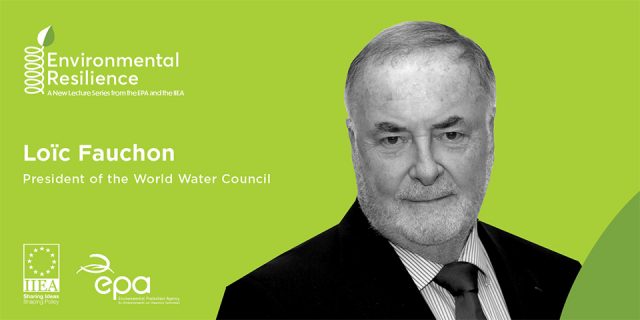Environmental Resilience and the Future of Water

Author: Luke O Callaghan-White
Introduction
The first lecture of the Environmental Resilience series in 2021, co-organised by the IIEA and EPA, will take place on Monday 1 February. On this occasion, Loïc Fauchon, President of the World Water Council, will argue that greater water security, improved water quality and sanitation infrastructure are prerequisites for ecological resilience and sustainable development. A link to this event can be found here. This blog aims to give some background to the themes that will be discussed during the Environmental Resilience series and to provide analysis of the major issues driving the international water sustainability agenda.
Environmental Resilience and COVID-19
An important, yet underappreciated, consequence of the COVID-19 pandemic has been to clarify the critical nexus between environment and public health. Air pollution can, for example, contribute to a variety of lung conditions, which typically worsen the effects of COVID-19; biodiversity loss makes zoonotic diseases more likely to spread; and many of the root causes of climate change also increase the risk of further pandemics.[1]
Over the last year, most Europeans have been asked to stay home and work remotely, where possible. One unexpected, yet positive, outcome of this lockdown period is that many citizens have become re-acquainted with their local environments, green spaces, and natural resources. This has led to an increased appreciation of natural capital and a subsequent awareness of the importance of improving environmental standards among the public. Recent findings suggest that, during the pandemic, public support for programmes aimed at more resilient and sustainable living environments have increased significantly.[2]
While 2020, saw an unparalleled decline in global CO2 emissions, primarily due to the social and economic consequences of COVID-19, it was also the warmest year on record, placing increased stress on Earth systems, many of which are already close to tipping points. Nonetheless, there is a considerable opportunity for policy makers, business leaders, and citizens to decouple environmental harm from economic growth and chart a sustainable future. By building on new perceptions of our shared environment and pursuing policies which improve air quality and water sustainability, which prioritise a new circular economy, and which raise the standards of environmental protection, society can move from a fragile status quo and develop environmental resilience.
The EU and Water Sustainability
The European Commission has introduced the Biodiversity Strategy 2030 to act as the framework to set Europe on the path to ecological recovery over the next decade. The restoration of freshwater ecosystems, enhanced water quality, sustainable ocean management, and the development of a ‘blue circular economy’ are key initiatives of this strategy. This strategy is well funded, and the Commission will allocate €20 billion per year for such measures to restore biodiversity.
The Commission states that improving water sustainability practices will be essential to realise a range of sustainable development goals, but it is also crucial to the European economy. The EU’s water-dependent sectors generate €3.4 trillion and employ 44 million people.[3] Capital investments in these initiatives are not perceived to be simply prudent methods of enhancing water resilience in Europe, but they also provide economic investment and lead to the generation of direct and indirect local jobs. This is particularly salient as the EU responds to widespread unemployment caused by the effects of COVID-19.
The Future of Sustainable Water
At an international level, the effort to improve water quality, enhance water security, and develop water sustainability practices are steered by organisations such as the World Water Council, an international multi-stakeholder organisation which mobilises action on critical water issues. The success of the World Water Council, to position water issues as a priority in the global political agenda, is borne out by the adoption of frameworks such as the EU’s Biodiversity Strategy. Increased attention and action on water sustainability means that the future of water will be different to the present.
Forecasts for the future of sustainable water rely on stronger coordination and collaboration, a new commitment to digital solutions, and strategic investments to improves resilience to climate change.[4] The deployment of new digital technologies to fortify water sanitation infrastructure, the introduction of climate-resilient political agendas, and shifting citizens attitudes will produce profound changes to water quality in the future.
The future of water presents both opportunity and risk for industry stakeholders, utilities, policy makers, and consumers. The COVID-19 pandemic has illuminated the fragility of our shared environment and heightened awareness of the need to improve the governance of our key natural resources.
[2] https://link.springer.com/article/10.1007/s10640-020-00445-w
[3] https://ec.europa.eu/environment/water/fitness_check_of_the_eu_water_legislation/
documents/Water%20Fitness%20Check%20-%20SWD(2019)439%20-%20web.pdf
